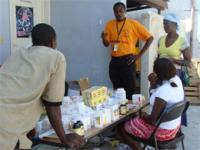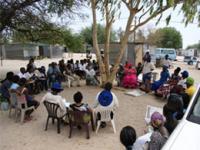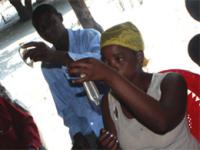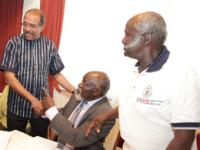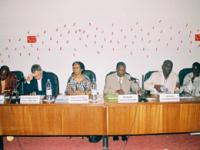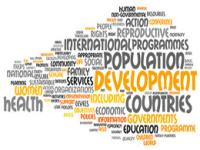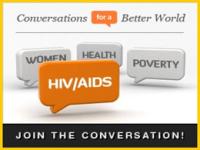
Campaign materials with HIV prevention messages will be sent to 800 000 households in Brazil.
Credit: M. de Sousa Silva
For the first time in Brazil, post offices will join efforts to prevent new HIV infections. The local take on the global campaign “Post Offices Fighting Against AIDS”, was launched Tuesday 9 February in a post office in Brasilia, the capital of the country.
Brazil, with an estimated 730 000 people living with HIV, is one of seven pilot-countries participating in this global initiative launched in 2009 by UNAIDS, Universal Postal Union (UPU), International Labour Organization (ILO) and UNI Global Union. The objective is to mobilize the network of 660,000 post offices around the world in the AIDS response.
The campaign will span more than 12 000 Post Offices in Brazil. Materials includes leaflets, posters, post-cards and a special letter with HIV prevention messages – all adapted to the Brazilian context.
The post office, with its wide reaching distribution network, offers a strategic entry point to reach the general population and post office staff with HIV prevention messages.
Pedro Chequer, UNAIDS country coordinator for Brazil
For example, the international slogan “Your post office cares” has been adapted to include an explicit prevention message: “The post offices are fighting against AIDS. What about you? Protect yourself: use condoms.”
The Minister of Health, Mr. José Gomes Temporão stressed the confidence and recognition of national post offices in Brazil and reinforced the commitment of the Brazilian government to the fight against prejudice, discrimination and to the consolidation of an inclusive and human rights based policy in the response to AIDS when speaking at the launch.
In the campaign’s first phase, materials will be distributed in the Federal District–where Brasilia is located–and in the priority regions of Amazonas and Bahia, states were UNAIDS and other UN agencies implement a joint programme to support the HIV response.
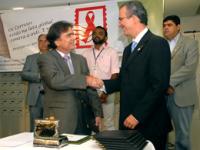
José Gomes Temporão, Minister of Health, and Carlos Henrique Custódio, the National Post Office President, at the launch of the post office HIV prevention campaign. Brasilia, 9 February, 2010.
Credit: M. de Sousa Silva
The Brazilian effort goes beyond the international initiative by delivering around 800 000 letters with HIV prevention messages to households in pilot regions. So for the first time ever in the country, families will receive HIV prevention information at home, through a special mail service delivery.
During the launch event, UNAIDS country coordinator for Brazil Mr Pedro Chequer said, “The post office, with its wide reaching distribution network, offers a strategic entry point to reach the general population and post office staff with HIV prevention messages. A multi-sectoral approache like this campaign will strengthen the AIDS response in the Brazil”.
For the campaign, a special web site has been launched containing information on AIDS and other sexually transmitted infections, details about the campaign with all campaign materials available for download and distribution. The web site includes a quiz for evaluation of personal HIV risk and a “contact us” section, coordinated by UNAIDS.
A special stamp has also been developed, containing the symbol of the campaign. The President of the National Post Offices in Brazil, Mr. Carlos Henrique Custódio highlighted the importance of such an initiative to be launched just before Carnival, when HIV prevention initiatives are reinforced by the government.

Pedro Chequer, UNAIDS country coordinator for Brazil spoke of the importance of a multi-sectoral approach in the AIDS response. Brasilia, 9 February, 2010. Credit: M. de Sousa Silva
In a second phase of the campaign, the International Labour Organization will support the development of a toolkit for postal employers to inform their staff about HIV in Brazil.
The “Post Offices Fighting Against AIDS” campaign is a partnership between the Brazilian Ministry of Communications, the National Post Offices, UNAIDS, the Ministry of Health, ILO, UPU, UNI Global Union and the National Federation of Employees from Post Offices, Telegraphs and related enterprises. The first phase of this global campaign will reach postal customers and post office staff in seven countries,Brazil, Burkina Faso, Cameroon, China, Estonia, Mali and Nigeria.
Contact: UNAIDS Brazil – (55 61) 3038 9220 or imprensabrasil@unaids.org









